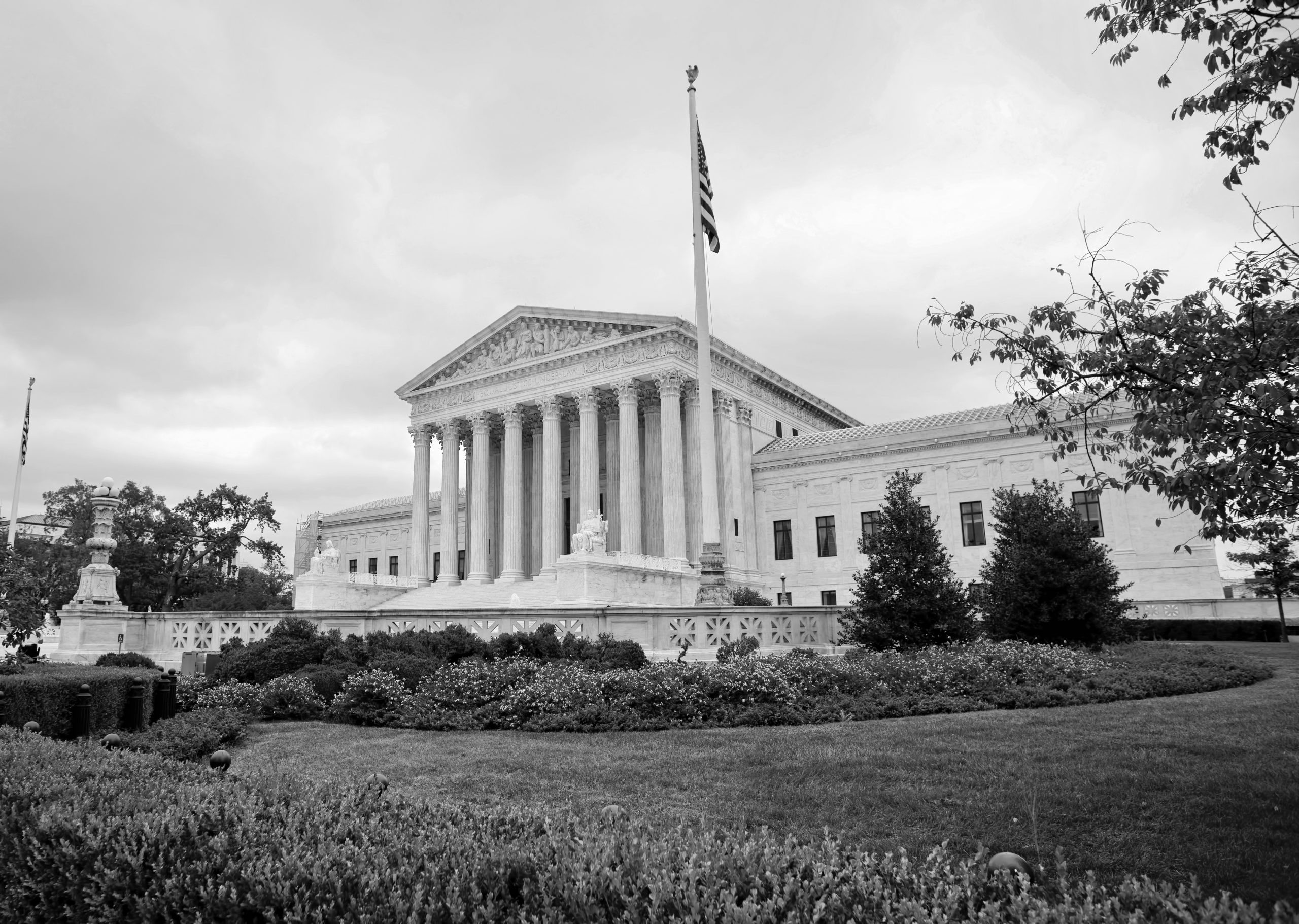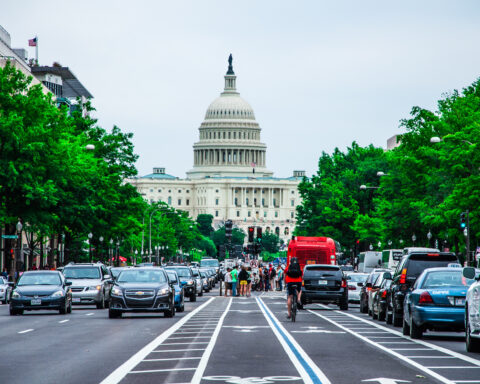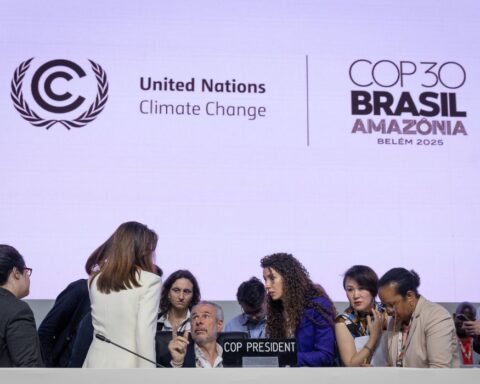The U.S. Supreme Court last week swatted down a “Hail Mary pass” from Republican attorneys general hoping to shield oil and gas companies from facing climate-deception lawsuits, thwarting another effort from fossil fuel industry allies to stop cases against the companies before they reach trial.
The rejection was the second time this year that the Supreme Court refused to wade into the lawsuits, which accuse oil companies of deceiving the public about the dangers of fossil fuels. “It’s pretty clear that the Supreme Court is not going to get involved until there’s a final judgment in one of these cases, and that’ll be after trial,” said Pat Parenteau, an environmental law professor and senior fellow at Vermont Law School.
While Big Oil companies recently won some lower-court battles in lawsuits brought against them by state and local governments, experts say the Supreme Court’s actions, along with positive rulings for communities in other cases, make it increasingly likely that fossil fuel companies will eventually stand trial in multiple courtrooms across the country.
Now that the Supreme Court has denied repeated attempts by the companies and their red state allies to have the cases tossed out of court, the day of reckoning is fast approaching.
– Pat Parenteau, Senior Fellow, Vermont Law School
The fossil fuel industry has itself admitted it could face “massive monetary liability” from the lawsuits. After another failed effort by industry allies to stop those cases at the Supreme Court, supporters of the cases are sounding alarms about the possibility that oil companies will turn to a Republican-controlled federal government to gift them a political escape hatch.
Minnesota lawsuit targeting ‘campaign of deception’ moves forward
One of the lawsuits the Republican attorneys general had targeted was brought by Minnesota Attorney General Keith Ellison against ExxonMobil, the American Petroleum Institute (API) and Koch Industries. Last month, in a victory for Minnesota, Judge Reynaldo Aligada upheld nearly all of the state’s claims accusing the companies and trade group of violating state laws through a “campaign of deception” about their products’ harm to the climate.
The lawsuit seeks to make Exxon, Koch and the API fund a corrective public education campaign about the link between fossil fuels and climate change, publish all the research they conducted on the subject, and disgorge the profits they made through false advertising, among other remedies.
Minnesota’s win followed a series of dismissals of climate-deception lawsuits in New Jersey and Maryland, where state court judges sided with oil companies in their characterizations of the cases as efforts to reduce global emissions, and determined that the states’ claims were preempted by federal law.
RELATED
Slate of lawsuits open new avenues of hope for climate campaigners
Juliana v. United States: No ordinary climate lawsuit
Environmental lawyers are stepping up to the challenge of Trump’s second term
Aligada called that argument “unpersuasive,” concluding that federal laws “would not preempt the State’s claims because those claims do not aim to restrain pollution or regulate emissions,” and that Minnesota’s complaint is about “state law consumer deception and failure-to-warn claims that have never been subject to federal common law.”
The ruling added Minnesota to a list of climate accountability plaintiffs – including Massachusetts, Honolulu, Vermont and Boulder – that have prevailed over fossil fuel defendants’ motions to dismiss their cases, some of which dealt with the same question of preemption and what the cases seek to achieve.
In January, the U.S. Supreme Court declined to review a ruling from the Hawai‘i Supreme Court that rejected Big Oil’s federal preemption arguments against Honolulu’s case. The Colorado Supreme Court will soon decide whether to uphold a similar ruling that allowed Boulder’s lawsuit against ExxonMobil and Suncor Energy to proceed toward trial.
Puerto Rico takes a page from court victories against Big Tobacco
In Puerto Rico, a newer legal theory for climate-deception cases is poised to get a green light to move forward in federal court.
Puerto Rico municipalities were the first to charge fossil fuel companies with violating the federal RICO (Racketeer Influenced and Corrupt Organizations) Act, arguing in their lawsuit that oil majors engaged in a “multi-year, multi-million-dollar, multi-organization propaganda deception campaign designed explicitly to undermine climate science.” Those RICO charges have now “survived the first test,” Parenteau said, after a magistrate judge recommended in February that the 37 municipalities’ racketeering and antitrust claims be upheld.
Racketeering and antitrust charges may be new for climate litigation, but they were leveraged by the U.S. Department of Justice against major tobacco corporations, which in 2006 were found guilty of coordinating to deceive the public about the link between smoking and cancer. State-level racketeering claims have also been added to the complaint filed against fossil fuel companies by Hoboken, New Jersey.
In his recommendations to the federal district court judge on how the case should proceed, Magistrate Judge Héctor Ramos-Vega in San Juan said he would grant oil companies’ motions to dismiss Puerto Rico law-based claims including fraud, public nuisance and failure to warn, finding that they were inadequately laid out in the complaint. Yet he joined Aligada and other state court judges in rejecting the companies’ arguments that the lawsuits are aimed at reducing emissions and should be tossed out.
Local officials involved in the case are seeking to make Big Oil help pay for their communities to recover from a series of fatal hurricanes in 2017, including Hurricane Maria, and to adapt to future threats. Those disasters were in part the result of the companies’ campaigns “to convince consumers that their fossil fuel-based products did not – and would not – alter the climate, knowing full well the consequences of their combined carbon pollution on Puerto Rico,” according to the complaint.
“At the heart of Plaintiffs’ claims for relief is a purported decades-long misinformation and propaganda campaign,” Ramos-Vega wrote. “Thus, the culprit is Defendants’ words, not their emissions.”
Oil industry allies reach for Republican support
There are growing signs that industry allies are not resting on their laurels as cases against Big Oil continue to inch forward.
Last month, an industry front group called American Energy Institute launched a new campaign bemoaning “coordinated lawfare from radical climate groups” as “the biggest risk” to President Trump’s energy agenda. In The Guardian, Dharna Noor reported that a truck parked outside a major conference of oil and gas executives in Houston was broadcasting that “lawfare and anti-energy laws are threatening America’s pro-consumer energy dominance” and linking to an op-ed by another front group, Alliance for Consumers.
The groups have ties to conservative billionaire Leonard Leo, who was also linked to allied interest groups that unsuccessfully pushed Supreme Court justices to take up the cases. In response to the justices’ latest denial, Minnesota Attorney General Ellison also drew a connection: “The Republican Attorneys General Association takes its marching orders from its largest donors: fossil fuel interests and Leonard Leo.”
Advocates now fear that this same network and others, having failed to persuade the justices to step in, could turn to Congress to provide immunity to the industry. Last week, nearly 200 advocacy groups urged Senate Minority LeaderChuck Schumer and House Minority Leader Hakeem Jeffries to preemptively oppose any liability waiver for fossil fuel companies.
Tom Pyle, president of the industry-aligned think tank Institute for Energy Research, told E&E News that advocates’ concerns were “complete and total paranoia.” But there’s a well-documented history to back them up. An immunity provision for Big Oil has twice made its way into other proposed pieces of legislation, in 2017 and 2020.
With more cases poised to reach trial, Parenteau said, the industry might not pass up the opportunity to “seek protection from the Republican-controlled Congress.”
“Now that the Supreme Court has denied repeated attempts by the companies and their red state allies to have the cases tossed out of court, the day of reckoning is fast approaching,” he said.
This article by ExxonKnews is published here as part of the global journalism collaboration Covering Climate Now. It has been edited to conform with Corporate Knights style. You can read the original here.







